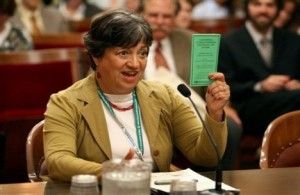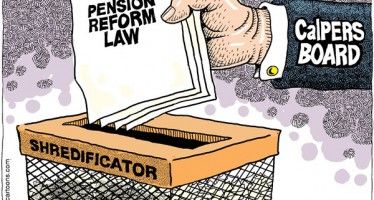CARB honcho Mary Nichols makes power grab
By Katy Grimes
SACRAMENTO — What do the California Air Resources Board, the Transit Authority, the Highway Patrol, the Department of Transportation, the Department of Motor Vehicles and the Bar Pilots have in common?
More than you would think.
Because all vehicles, railroads, aircraft, freight movers and floating vessels are polluters, California Air Resources Board Chair Mary Nichols (pictured nearby) would like a say in regulating them.
The Assembly Transportation Committee originally announced it would meet on Monday, Feb. 4. The meeting agenda said it was to be about Assembly Bill 8, which would increase or extend $2.3 billion of fees on car owners until 2023. According to Jon Coupal, President of the Howard Jarvis Taxpayers Association, these will include smog abatement fees, air quality management district fees, vehicle and boat registration fees and new tire fees.
However, AB 8 was dropped from the agenda, and no mention of it was made at the two and one-half hour hearing.
California transportation
The hearing instead was an overview of all of the state agencies under the purview of the Transportation Committee: Business, Transportation and Housing, Department of Transportation, California Highway Patrol, Office of Traffic Safety, the California Transportation Commission, High Speed Rail Authority, DMV and the Board of Pilots Commission.
Sitting quietly through all of the presentations, Nichols finally had a turn at the microphone as the last presenter. It was initially unclear why Nichols was at the hearing. But unabashed and unguarded, Nichols is apparently injecting herself, and her growing agency, into all the state’s transportation issues.
“We have business before you this year,” Nichols told lawmakers. She explained she was there “because California’s life blood is the transportation system.” But, Nichols warned that transportation is responsible for climate change and air quality problems. In order to meet California’s climate change objectives, emissions need to be reduced “on roads and water.”
She added, “All contribute to climate issues.”
But Nichols didn’t stop there. “Our role is also to work on urban planning,” she said. “As regions plan roads and cities, we need them to be more walkable, bikeable and more healthy for their residents.”
Transportation issues in the state, she said, “[are] our business because of AB 32.”
Technology and cars
AB 32, California’s Global Warming Solutions Act, requires cutting greenhouse gas emissions in California to 1990 levels by year 2020. Nichols said that, because of new clean technology in cars, owners will spend an additional $4,000 over the life of the car. But she said, “The costs will be paid back in cheaper gas.”
Nichols said CARB is holding a contest among fuel manufacturers.
CARB is working with the Plug-in Electric Vehicles Collaborative, which claims to be “a multi-stakeholder public-private partnership, [working] to ensure a strong and enduring transition to a plug-in electric vehicle market in California.” The group recently hired termed-out Democratic state Sen. Christine Kehoe as its executive director.
“They are working on low-carbon fuels, but lagging behind on their goals. Bio fuels manufacturing is expanding, but we don’t know which fuels will win,” Nichols said.
Target on freight movers
This is where Nichols’ purpose for being at the hearing became clear. “I should mention here, freight, from an economic perspective and emissions perspective… the focus needs to be on freight as a primary source of pollution,” she said.
“The ARB has taken policies to cut emissions. We’ve cut seven tons a day. Expect 100 tons a day,” Nichols added. “In a world where carbon is an overarching concern,” she said CARB is planning for cutting emissions from the freight industry. And this means all modes of freight — cargo, rail, truck and air.
Accolades and congratulations
“We have to find ways to make communities safer and healthier, and still allow these to grow, she said. “In conclusion, California has a lot to be proud of. This has made us the premier agency in the world reducing toxins and emissions, with AB 32, AB 118, and SB 375…. People around the world know those bill numbers, but not what they are,” she said with a laugh. “Our bills are known around the world.”
AB 118 is the California Alternative and Renewable Fuel, Vehicle Technology, Clean Air, and Carbon Reduction Act of 2007. It established the Air Quality Improvement Program, which is administered by CARB.
SB 375 is the Sustainable Communities and Climate Protection Act of 2008, which limits and regulates housing and transportation growth.
Related Articles
J.B. says reforming CEQA is ‘Lord’s Work’
Aug. 28, 2012 By Wayne Lusvardi In Archibald MacLeish’s 1958 play, “J.B.,” the devil disguised as a popcorn vendor destroys the
Only in CA: Mandating ‘smart guns’ in future with bill now
March 22, 2013 By Josephine Djuhana “Owner-authorized” firearm technology. Biometric scanners. Guns with palm print readers that don’t go off
Public pension struggles roil CA
The public pensions crisis has not subsided in California — nor has the conflict that surrounds it. A waves of political,




